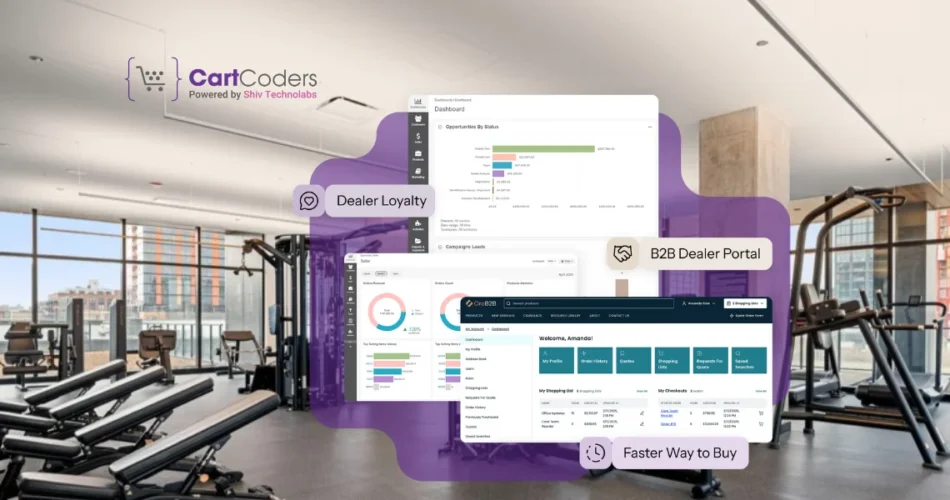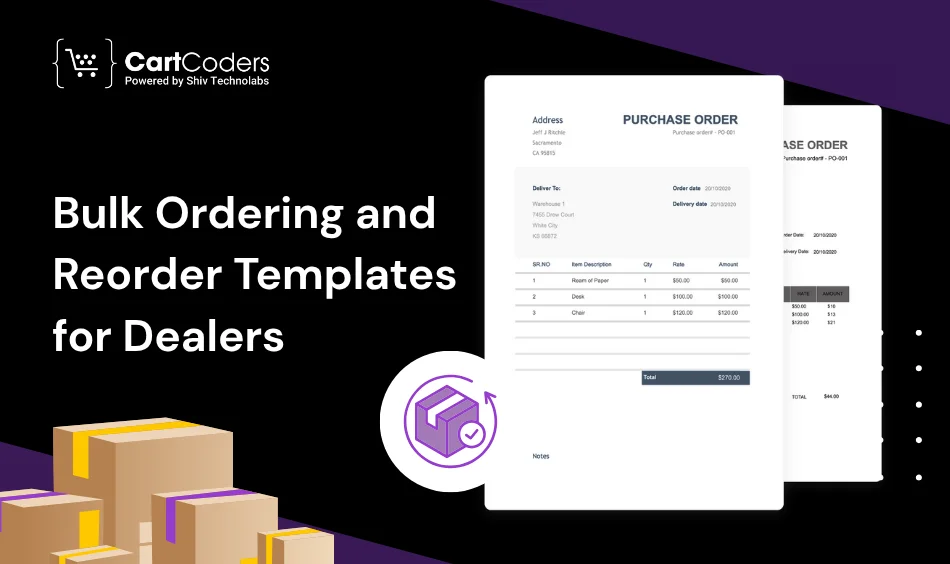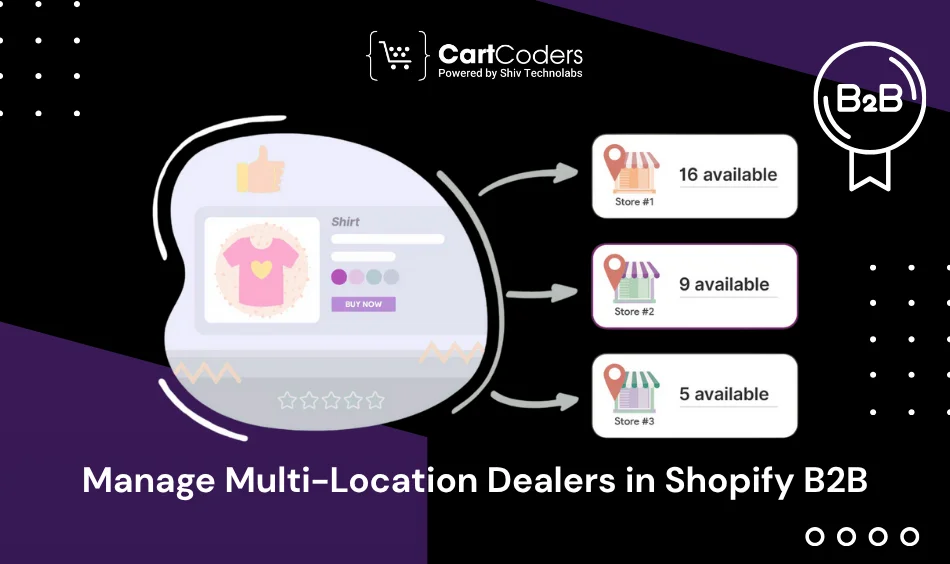Custom Engagement Solutions
Unlock tailored solutions with a free, no-obligation strategy session.
Expert Developers & Engineers on Demand
Scale Your Team with Skilled IT Professionals
Expert Guidance for Digital Transformation

B2B fitness distributors deal with heavy, high-value products—treadmills, racks, flooring, and accessories. Managing quotes, bulk shipments, returns, and multi-branch accounts over calls or spreadsheets often creates delays and pricing errors.
A dealer portal brings structure to that process. It allows dealers to log in, check inventory, request quotes, place orders, and manage warranties from one system. For distributors, it cuts manual work and gives visibility across every channel.
This guide breaks down how modern dealer portals transform fitness equipment distribution—from bulk reorders to credit limits—and why many suppliers are integrating them into their Shopify-based B2B stores.
B2B distributors handle more than just bulk sales. They coordinate freight, track dealer-specific prices, manage quotes, and store warranty documents for every order. When this data lives in spreadsheets or inboxes, it slows down the entire sales cycle.
A dealer portal brings everything under one roof. It allows distributors to:
By centralizing these processes, distributors improve accuracy, shorten order timelines, and maintain stronger relationships with their dealer network.

For gym equipment distributors, repeat sales drive the business forward. Dealers frequently restock essentials — weights, mats, cables, and replacement parts — which means the ability to reorder quickly is critical.
Dealer portals make this process faster and more reliable through smart ordering tools like:
| Feature | How It Helps |
| Quick Order Forms | Dealers can add multiple SKUs at once without navigating product pages. |
| CSV Uploads | Bulk items can be imported directly into the cart, saving hours of manual entry. |
| Reorder Templates | Frequent orders are saved and reused with one click, ideal for restocks. |
| Bundle Lists | Dealers can create gym packages or recurring sets like “Starter Studio Kit.” |
This structure reduces repetitive input and minimizes pricing or quantity errors.
It also helps distributors analyze what products move fastest — valuable insight when planning stock or forecasting seasonal trends.
In the fitness equipment industry, post-sale support matters as much as the initial order. Dealers often handle warranty issues such as motor failures, damaged parts, or replacement cables. Managing these cases manually can lead to lost records and frustrated customers.
A dealer portal simplifies the entire warranty process by offering:
This self-service model keeps both dealers and distributors informed in real time.
It shortens turnaround times, reduces communication errors, and maintains clear accountability from claim submission to resolution.
Large gym equipment orders often involve extended payment terms or partial deposits. Dealers prefer flexibility, while distributors need financial control — a balance that’s hard to maintain without a structured system.
Dealer portals handle this efficiently through built-in credit management tools such as:
| Credit Setup | Description | Ideal For |
| Net-30 / Net-45 Terms | Payment is due after an agreed period. | Established dealers and franchise chains. |
| Deposit-Based Orders | Dealers pay a fixed percentage upfront. | Custom or made-to-order products. |
| Credit Limits | Spending caps are defined per dealer account. | New or regional partners. |
| Invoice & Balance View | Real-time visibility into outstanding payments. | Accounting teams and managers. |
These rules keep transactions predictable and transparent. Dealers get flexible financing, while distributors maintain oversight of pending dues — strengthening long-term trust between both sides.

Many fitness distributors work with dealers that operate across several branches — each with its own staff, address, and purchasing limits. Without a centralized system, orders from different outlets can overlap or create billing confusion.
Dealer portals built for multi-location management solve that problem by allowing distributors to:
This setup gives every branch autonomy while preserving unified control.
It keeps purchasing consistent, simplifies freight scheduling, and makes record-keeping easier when dealers operate at scale.
As order volumes rise, spreadsheets and manual approvals start holding teams back. Once a distributor manages more than a handful of dealers, a structured B2B portal becomes less of a luxury and more of a requirement.
You know it’s time to invest in one when:
For Shopify merchants, implementing a dealer portal doesn’t mean building a separate site. Platforms such as Wholesale-B2B by CartCoders let distributors introduce dealer logins, custom pricing, and credit workflows inside their existing store.
It’s a straightforward way to bring structure, visibility, and consistency to growing B2B operations.
Dealer portals don’t just simplify processes—they create measurable gains across the entire sales cycle. From faster approvals to fewer manual errors, distributors can track the difference within weeks of implementation.
| Metric | Before Portal | After Portal |
| Quote turnaround | 2–3 days | Same day |
| Manual data entry | High | Minimal |
| Order accuracy | Around 80% | Over 98% |
| Warranty resolution time | 10 days | 3–4 days |
| Dealer retention | Moderate | Significantly higher |
These numbers reflect more than efficiency; they indicate stronger relationships between distributors and their dealer network.
When dealers get transparency, accurate freight data, and easy access to credit or warranty details, they stay loyal and order more often.
That consistent, predictable workflow forms the foundation of scalable B2B fitness operations.
For B2B fitness distributors, a dealer portal isn’t just about automation — it’s about building a framework that supports long-term growth. When bulk orders, credit rules, and freight handling start taking too much manual effort, a structured Shopify-based system becomes essential.
At CartCoders, we help fitness and equipment brands design, build, and customize their online store and Shopify B2B dealer portals tailored to their operations. Our team focuses on:
We also develop and support the Wholesale-B2B Shopify app, which makes these workflows possible for distributors without rebuilding their entire site.
Whether you’re planning to upgrade an existing dealer system or build a new B2B portal from scratch, contact CartCoders to help you create a platform that’s fast, reliable, and built for growth.
Dealer portals have become the backbone of modern B2B fitness equipment distribution. They simplify every touchpoint—from pricing and freight to warranties and payments—while giving both dealers and distributors real-time control over their operations.
As networks grow, managing everything manually becomes impossible. A centralized system built on Shopify helps maintain consistency across multiple dealers, regions, and product categories. It reduces errors, improves visibility, and strengthens trust between every business partner involved.
At CartCoders, we’ve seen how structured B2B systems transform everyday operations for fitness brands. Whether it’s bulk ordering, credit management, or multi-location dealer coordination, the right foundation keeps growth sustainable.
For distributors ready to scale, adopting a purpose-built dealer portal is not just a step forward—it’s a long-term advantage.
A dealer portal is a secure online platform where fitness equipment distributors and their dealers manage pricing, quotes, orders, and service requests. It centralizes bulk purchasing, freight tracking, and warranty processes within one connected system.
Dealers receive personalized pricing through Shopify’s B2B features or wholesale apps. Each account is assigned tier-based or region-specific pricing, so when they log in, all product prices automatically reflect their negotiated dealer rates.
Yes. Many B2B setups on Shopify allow CSV uploads for large or repeat orders. Dealers can import product lists directly into the cart, verify pricing, and place multiple-SKU orders in one action without manual entry.
Distributors can enable net terms by setting payment rules for each dealer account. Shopify supports invoice-based billing, allowing dealers to complete purchases with flexible payment timelines such as Net-15, Net-30, or deposit-based terms.
Freight quotes appear automatically at checkout when shipping settings include dimensional weight and carrier integrations. The system calculates rates for bulky or multi-box fitness equipment based on delivery method and location.
Dealer portals simplify warranty handling by allowing online claim submissions, part replacement requests, and tracking. Each claim is linked to the original order, helping distributors process service cases faster and maintain clear documentation.
Yes. Multi-branch dealers can operate under a parent account with sub-logins for each branch. This setup keeps orders, credit limits, and shipping addresses organized while giving distributors a unified view of dealer performance.
Modern dealer portals integrate with LTL and parcel carriers. Dealers can monitor live shipment progress, access proof-of-delivery details, and get notifications for in-transit or completed deliveries directly from their dashboard.
Distributors can access reports on dealer activity, order frequency, credit usage, and stock movement. These analytics support better demand forecasting and help identify top-performing dealers for strategic account planning.
Online B2B systems reduce manual work, cut communication delays, and keep every transaction traceable. For distributors managing multiple dealers, digital portals bring accuracy, speed, and transparency to operations that were once handled offline.
Projects delivered in 15+ industries.
95% retention rate, building lasting partnerships.
Serving clients across 25+ countries.
60+ pros | 10+ years of experience.